Fortress of fear: how long can Australia keep shutting out the world?
Shielded from the pandemic, a jittery nation has embraced the darker side of its psyche.
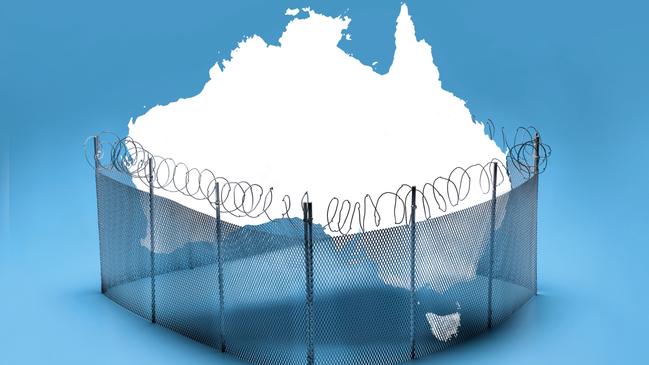
When Fiona Pyke returned to Australia in November after eight years in the US, she noticed a mood she had never felt before in her homeland. Australia had all but locked itself away from the world to protect against the rampaging coronavirus, but that was not what upset her. What rattled the 54-year-old Melbourne mother was a new psyche of fear that had gripped her own extended family, her friends and so many of her fellow Australians.
“The moment you mention you just got back from America, people literally take a step back,” she says. “There is this irrational belief that everyone who comes from overseas is going to kill them. I find it incredible that for a country that has almost no Covid, they are mortally terrified of it. As a result we see these ridiculous lockdowns for one person being sick and then they lock down a whole city.”
Seven months after her return, with more people getting vaccinated, Pyke believes ordinary Australians are increasingly losing the plot over the pandemic, allowing fear to trump their easygoing nature. She’s not alone in her belief that a jittery nation has embraced the darker side of its psyche by backing a Fortress Australia mentality that ignores the cries of its fellow citizens stranded overseas, or wanting to travel overseas, and is increasingly out of step with the western world as it emerges from the pandemic through vaccines. “Australians have always said ‘we will tough it out together’ but not anymore,” Pyke says. “Now that only applies to those Australians who are home and ‘stuff the rest of you who are still overseas’.
“The one statement I really dislike is when people say you must be happy to be home where it is safe. It just shows they have no concept that you can be safe without living in a fortress. There are lots of people around the world who are fine living with this virus by taking sensible precautions. When I tell people here this country has got to toughen up, I get stares that you would reserve for something you scrape off your feet. I just wish Australians would listen to what Australians returning from overseas are saying. But they are not listening.”
Western countries such as the US, Canada and much of Europe are returning to semi-normality with plunging Covid deaths as vaccines roll out at a steady pace. But voices such as Pyke’s are falling on deaf ears in locked-away Australia, where the vaccine rollout has been slow and at times chaotic. When the recent federal budget made the stunning assumption that Australia’s international borders would be closed until at least the middle of next year, there was barely a ripple of public protest. A Newspoll in May showed 73 per cent of Australians across the political spectrum supported the Morrison Government’s approach on closed borders through to mid-2022, with older Australians more likely to favour closed borders than younger ones.
Only one in three Australians believe the Government should do more to help return the roughly 30,000 Australians still stranded overseas. Just one in five support reopening borders even under a full vaccination scenario until the virus is under control globally. For Morrison and the shutdown-prone state premiers, this sentiment buttresses a Fortress Australia approach to the pandemic – their approval ratings have rarely been higher.
The Federal Government has no plans to relax the limits on the number of Australians allowed to return. Those wanting to leave must apply for an exemption. Back home, the pleadings of industries that have been smashed by the pandemic, such as the universities that lost their overseas students, the travel and airline industries and the hotels and pubs, have all failed to sway the Government from its isolationist course. “We have to be careful not to exchange our way of life for what everyone else has,” Morrison said in May, adding he doesn’t “see an appetite” for Australia opening to the world. “All I know is once you let it back in… you cannot get it out. You’ve crossed that threshold.”
As if to underline that mood, Morrison – who last year criticised state premiers for lockdowns but switched to supporting them – threatened jail terms if Australians in Covid-ravaged India dared to return to their own country. The resulting outcry forced the Government to claim it would never jail its own citizens for returning home. But the fact that such a policy – one that no other democratic nation in the world has contemplated – was even considered to be acceptable in Canberra says much about the depth of this mindset.
More recently, at the G7 meeting in England, Morrison gave no hint of when Australia’s borders would open, saying: “We’ll continue to take an Australian path on this which protects the lives and livelihoods and learn from the experiences of other countries. I’d rather be living in the arrangements we have in Australia than anywhere else in the world.”
And yet in the US, for example, where almost every American who wants the vaccine has now had it, there are no travel restrictions and no lockdowns. Americans will be able to fly to Europe for holidays this northern summer. Even hard-hit New York City has reopened. Meanwhile, in Australia even interstate travel is fraught as states lock their borders to other states; Melbourne has just finished its fourth lockdown; areas of Sydney are currently in lockdown.
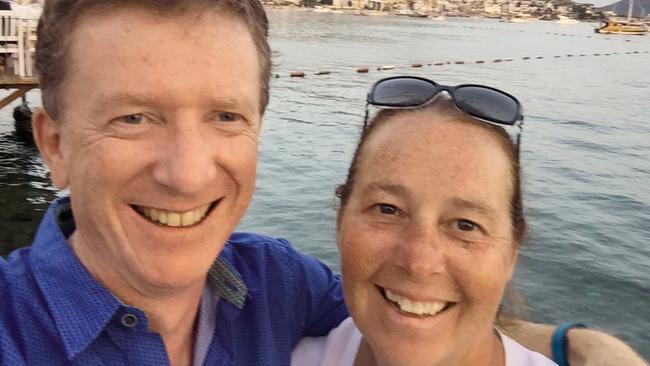
“Where does this thinking come from?” asks Sydney mother Allison Bradwell as she fights back tears on the phone from Kuala Lumpur, where she and her husband are currently living. “Never did I think my Australian passport isn’t actually worth anything, but that’s what it is now, a worthless piece of junk,” says the 54-year-old, who could not get home last year to visit her sick father-in-law.
“I worry that Covid has changed Australia,” says Bradwell. “Australians have always been supportive of victims in bushfires and floods but when it comes to those of us who are overseas they are like, ‘It’s not our problem, they chose to leave so they are not Australian anymore.’ I think Covid has divided us in a way that never happened before.”
So, has the pandemic changed the psyche of Australians? Has it made us more insular, more fearful and more selfish than we once were? Or is this an understandable position given our desire to keep the virus at bay in a country that has lost fewer than 1000 people to the pandemic – a spectacular success compared with the rest of the world?
“I don’t think Fortress Australia is consistent with our character as a modern Australia,” says professor Tim Soutphommasane, a political theorist at the University of Sydney and former race discrimination commissioner. “We are an immigrant nation and a trading nation and you can’t separate our society, culture and economy from the rest of the world. Yet there is a significant section of our population that seems perfectly content with having our borders closed indefinitely. Fear of the virus has got to a point where we are seeing callous indifference to the plight of our fellow citizens. What kind of country is content to pull up the drawbridge to its own citizens in a time of need?” Soutphommasane says Australia is risking its economic and social future and its reputation by remaining a “hermit” nation at a time when it should be opening back up to the world. “We are, right now, a nation in cultural and psychological retreat,” he says. “We may be winning the war against the pandemic, but we are at serious risk of losing the peace.”
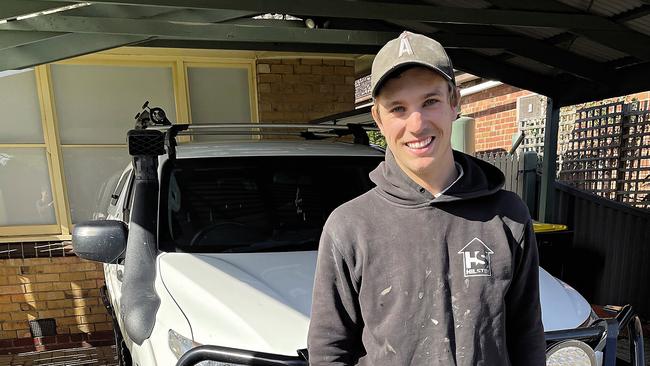
Declan Tragear is one of many who disagree with such sentiments. “I think it’s too dangerous to let any more Australians back into the country right now,” he says as he parks his SUV in his garage in southeastern Melbourne. The 21-year-old carpenter and his girlfriend, a personal trainer, spent much of last year without work because of the Melbourne lockdowns and he doesn’t want to risk a repeat. “After not getting much work for a year, my industry is finally busy again and so I don’t want to jeopardise that,” he says, just before Melbourne is plunged into another lockdown. “Those Australians overseas have had a long time to come home. If you’ve left the country and haven’t come back by now then the risk is on you,” he says.
A few blocks away, Andre Levitan walks his dog and talks about the “perfect job” the Government has done in taming the virus. The 59-year-old South African-born auditor says he misses being able to see his family back in South Africa but adds: “I don’t want to be exposed to anything that’s going on in the rest of the world. We are sitting ducks. Yes, there are desperate people that need to get back to Australia but a lot of these people chose to travel and I don’t believe we should force the Government to let them back.”.
At a cafe nearby, hotel manager Stephen Hamilton, 61, loves the fact that Australians have promoted the rights of “the herd” over those of the individual. “I always look at the downside risk and if it gets out of control here, like in India, what are they going to do?” he says. “No arms were twisted for people to leave the country. I am for the best interests of the herd. You can talk about individual rights but if it threatens the welfare of the herd, then it is unfair.”
Many of those who oppose bringing more Australians home or opening the borders before the middle of next year say they do not trust the city-based hotel quarantine system. They say they would support moves towards greater openness if there were more remote quarantine facilities like those at Howard Springs in the Northern Territory.
As an island with a small population, Australia has at various times in its history embraced a fortress-like mentality to keep foreigners out. “Fortress Australia does have a certain cultural history,” says Soutphommasane. “Our national psyche has historically been shaped by the idea that our island nation is a sanctuary to be defended against external threats.” He says the old White Australia Policy and the more recent push to stop asylum-seeker boats are examples of “strong reflex actions of closing down our borders to any perceived threat. Now, though, we are seeing that reflex directed not just to outsiders but even to our own citizens.”
But historian Geoffrey Blainey believes the country’s stand should be seen as a response to fear rather than a lack of sympathy towards Australians overseas or the rest of the world. “Australia is like the US, it has an isolationist strand in its history and also an internationalist strand,” he says. “Our isolationist strand is perhaps overemphasised by commentators, including historians, at present. The feeling of isolation – call it the tyranny of distance if you like – has jumped to the fore during the pandemic. But it has, in the past 15 months, proved a great advantage to us and to New Zealand and has protected us so far from a higher death rate. Maybe the wariness about bringing Australians home is more a fear of infection than a lack of sympathy. Caution is therefore the mood.”
Nataly Gray, a 37-year-old Australian designer living with her husband in Cambodia, visited Australia last Christmas and recalls being invited to dinner in Brisbane by a friend, along with some other people she did not know. “Then my friend got a phone call from the others saying, ‘We are not going to come because we are worried about Nataly – she might have Covid’,” recalls Gray. “I had just been in quarantine, I had had five tests but still they didn’t feel comfortable with me being there. This seems to be the mentality of Australia at the moment. People make assumptions that don’t come from an informed place and it is so reactive and defensive. To be honest I’m starting to think Australia has become a selfish country during the pandemic. I feel that the mentality has changed for the worse.”
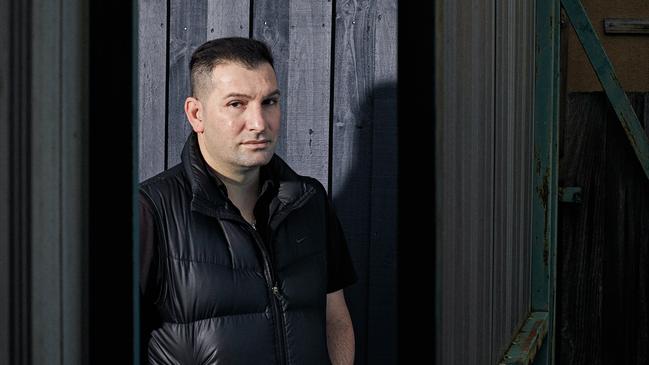
In a barbershop in Elsternwick in Melbourne’s inner south, barber and Iranian refugee Mehdi Zadeh admits his thinking on the issue has changed from being anti-isolationist to supporting a Fortress Australia approach. Zadeh, 39, came to Australia by boat in 2010, surviving a 14-day trip on an overcrowded Indonesian fishing boat after its engine failed. He spent another 18 months on Christmas Island before being granted refugee status. When the Covid lockdowns began, he says, especially the tough Melbourne lockdown, he was angry. He wondered whether he had swapped a repressive regime in Iran for a new country that was also willing to deny personal liberty.
“But now I have changed my mind completely,” says Zadeh, who lives with his wife and three-year-old daughter. “In the past two weeks I have lost two of my cousins and my aunty to Covid back in Iran. I don’t think they should let too many people back into Australia right now because I love my family here in this country where we have made a life. Australians complain a lot of Scott Morrison and [Victorian Premier] Dan Andrews but they are doing the right thing and it is good for Australia.”
Demographer Bernard Salt believes the country’s isolationist mood reflects a uniquely Australian aversion to risk. “European cultures, for example, have a much greater appetite for risk than Australia,” he says. “I suspect it comes down to a philosophical position in that we are a demographically young nation and we are looking to the future all of the time and we are anxious to protect that future. We are obsessed with anything that protects our lifestyle and we are prepared to trade our freedoms in order to protect that way of life. Americans are much more focused on their freedoms.”
This low-risk attitude is somewhat surprising given that about 30 per cent of Australians were born overseas and 45 per cent have at least one parent from overseas, says Salt. But he believes those who made the effort to resettle in Australia have become fully invested in protecting that new life. “It’s like, ‘I want to be safe and secure and I want to protect all of this going forward.’ Whether this is right or wrong is not the point, it is trying to get into the Australian psyche as to why en masse we would act like this.”
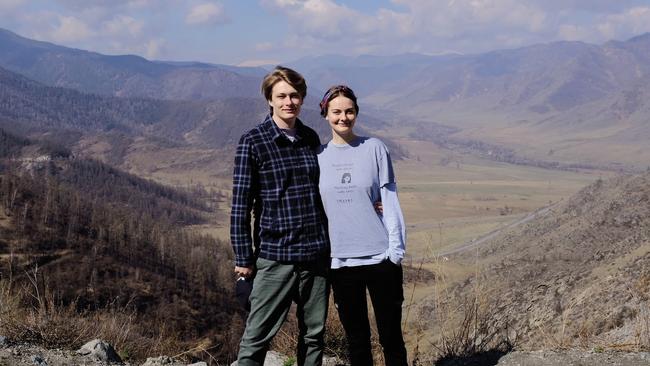
From Russia I get an email from James Cater, a 30-year-old photographer from Shoalhaven Heads, NSW, who has been stranded for a year after going there to visit his girlfriend Anna. He has become disheartened at being bumped repeatedly off commercial flights home and by the attitude of Australians, who he believes view people like himself as “lepers bringing in unstoppable disease”. Cater fears most Australians are ill-prepared for the truth that a zero-case eradication policy for Covid in Australia will never work. At some point soon, he says, once the vulnerable have been vaccinated, it is inevitable that Covid will live in Australia just as it does around the world. “I believe the restrictions initially, when we didn’t understand how to contain or treat the virus, were entirely sensible. But I think [now] the Australian public are not being made aware of the progress being made outside the country to effectively contain Covid. They are kept in a climate of fear and distrust that prevents them from being able to escape the bubble they have built for themselves.”
One of the few Australian politicians to publiclyquestion Australia’s current aversion to risk is Liberal Party senator James Paterson, who says too many political decisions are being delegated to health bureaucrats who are overly cautious by nature. “We certainly do take their [health bureaucrats’] advice very seriously, but ultimately we are a liberal democracy and decisions have to be made and should be made by elected politicians, not by their advisers,” he says. “If we followed the advice of public health we would ban alcohol advertising, we would have a sugar tax and we would ban smoking.”
A few health experts are now trying to pave the way for a change in public thinking, to persuade Australians that they will need to come to terms with the existence of the virus in the community once all Australians who want the vaccine have been vaccinated. “We need to somehow communicate to the public,” Victoria’s chief health officer Brett Sutton has said, “that we’ve gotten to a place of complacency because we’ve driven transmission to zero but we will face newly emerging transmission, and at a critical juncture where we need to make a call on letting it run.”
But from Kuala Lumpur, Allison Bradwell sees no sign of a change in the Fortress Australia mentality. “It’s a shit show on social media,” she says. “I saw one post that said stranded Aussies should have their citizenship removed because that would solve the problem. Another woman, from Victoria, said, ‘Why would anyone choose to leave Australia and be apart from their families, and if you chose that then tough luck, you stay there.’”
The woman who posted those comments, Madeleine Love, a 60-year-old mother of three from Marysville, says many Australians overseas have no gratitude for what their compatriots at home have sacrificed to make the country safe. “What I see a lot on Twitter is a complete lack of empathy or respect on their part about what we’ve been through, especially here in Victoria, on behalf of returned travellers,” she says. “Every trouble we’ve had in Australia is really a consequence of returned travellers – we would be a happy country with everyone alive if not for returned travellers. So I have had a lot of arguments with their rather thin voices on Twitter. [I ask them] ‘Why did you leave? Why did you move to the other side of the world from your loved ones? Don’t tell me it means so much.’”
Outside an op-shop in southern Melbourne, Ala Marcinczyk, 73, who emigrated to Australia from Poland in 1981, says she wishes more Australians were less hard-hearted about their own people. “The Australia I loved was an absolutely gorgeous country and the people were good and open-hearted but this is wrong, leaving Australians over there is wrong,” she says. “Australia is being way too cautious. Now I wonder what being Australian means.”
“There will be a very serious price to pay if we remain a closed nation,” Tim Soutphommasane warns. “Other countries are getting their populations vaccinated and are poised to surge ahead of us. Yet here we are, with an almost smug, parochial complacency. Let’s not be deluded, there will be major social and economic costs to becoming an isolationist, hermit nation. There’s a clear need for leaders to build a psychological runway for the nation to reopen its borders.”
Virgin Australia CEO Jayne Hrdlicka roared down that runway in May, warning that politicians would have to change their narrative and that Australians would have to accept some deaths for the borders to open. “It [the virus] will make us sick but won’t put us in hospital. Some people may die but it will be way smaller than the flu.”
The impetus for the country to abandon its Fortress Australia mentality may eventually come from outside rather than from within, Bernard Salt says: “We will be dragged forward by our peer nations.” But for two of those Aussies overseas – Allison Bradwell in Malaysia and Nataly Gray in Cambodia – the damage may have already been done. “I’ve never felt like this before about my own country,” says Bradwell tearily. “My husband’s contract is up next year but I’m asking myself, ‘Do we even want to go home anymore?’”
Gray says she and her husband have been saving to buy a house in Australia on their return but now their plans are on hold. “Unless the politics changes or the mentality changes, I am not sure we can go back,” she says. “I really value openness and freedom and compassion and kindness but I just don’t feel that Australia is like that anymore. I really hope that changes.”


To join the conversation, please log in. Don't have an account? Register
Join the conversation, you are commenting as Logout